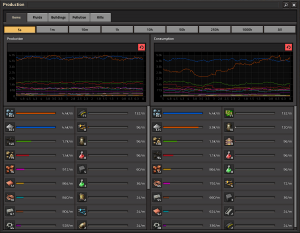Production statistics: Difference between revisions
PDiracDelta (talk | contribs) add clarification about science progress with regards to consumed science packs in case of productivity module use |
Some writing style fixes, slightly updated (still missing kills and pollution tab) |
||
| Line 1: | Line 1: | ||
{{Languages}} | {{Languages}} | ||
[[File:Production_Window.png|thumb|right|The production window in action.]]The '''production screen''' is a window that shows details about the rate at which your factory produces and consumes items. It also includes graphs to show how this information has changed over time. By default, it is accessed by pressing P in-game. | [[File:Production_Window.png|thumb|right|The production window in action.]]The '''production screen''' is a window that shows details about the rate at which your factory produces and consumes items. It also includes graphs to show how this information has changed over time. By default, it is accessed by pressing {{Keybinding|P}} in-game or via a button above the minimap. | ||
The timescale can be set to 5 seconds, 1 minute, 10 minutes, 1 hour, 10 hours, 50 hours, 250 hours or 1000 hours. At low timescales, the rate shown can be inaccurate because of the small number of items sampled to get the value. | |||
The timescale can be set to 5 seconds, 1 minute, 10 minutes, 1 hour, 10 hours, or | |||
== Production, Fluids and Buildings == | == Production, Fluids and Buildings == | ||
| Line 10: | Line 9: | ||
== Filtering the graph == | == Filtering the graph == | ||
If some items are produced at a significantly higher rate than others (this often happens with [[iron plate|iron]] and [[copper plate|copper plates]]), the graphs get compressed vertically so they can fit in the space. This makes it very hard to see how production has changed over time for other items. To alleviate the issue, the player can filter which items are to be shown on the graph by clicking the icons of the resources. This changes from the default view (all items visible) to a view where only the selected items are visible. The player can add more items to the selection by clicking the resource icons. To return to the default view there is a button in the upper right part of the item list. | If some items are produced at a significantly higher rate than others (this often happens with [[iron plate|iron]] and [[copper plate|copper plates]]), the graphs get compressed vertically so they can fit in the space. This makes it very hard to see how production has changed over time for other items. To alleviate the issue, the player can filter which items are to be shown on the graph by clicking the icons of the resources. This changes from the default view (all items visible) to a view where only the selected items are visible. The player can add more items to the selection by clicking the resource icons. To return to the default view there is a button in the upper right part of the item list. | ||
== Productivity modules == | == Productivity modules == | ||
Consumption only takes the consumed items into account and is not affected by any productivity bonuses. This means that science progress (which cannot be measured) is higher than the [[science pack]] consumption would suggest if productivity modules are used in [[lab]]s. | |||
{{C|GUI}} | {{C|GUI}} | ||
Revision as of 13:33, 2 March 2022

The production screen is a window that shows details about the rate at which your factory produces and consumes items. It also includes graphs to show how this information has changed over time. By default, it is accessed by pressing P in-game or via a button above the minimap.
The timescale can be set to 5 seconds, 1 minute, 10 minutes, 1 hour, 10 hours, 50 hours, 250 hours or 1000 hours. At low timescales, the rate shown can be inaccurate because of the small number of items sampled to get the value.
Production, Fluids and Buildings
The default tab, production, shows how many of a given product have been produced and consumed through assemblers, chemical plants etc. These can be from all categories, including ore, electronic circuits and transport belts. The production screen offers two additional tabs. The fluids tab works similarly to the production tab in that it shows produced and consumed fluids. This includes steam that is created to generate power, but also all oil-related fluids. The buildings tab gives an overview over which buildings the player (by hand or by bot) has placed into the world and deconstructed recently. This includes assembly machines and transport belts, but also trees.
Filtering the graph
If some items are produced at a significantly higher rate than others (this often happens with iron and copper plates), the graphs get compressed vertically so they can fit in the space. This makes it very hard to see how production has changed over time for other items. To alleviate the issue, the player can filter which items are to be shown on the graph by clicking the icons of the resources. This changes from the default view (all items visible) to a view where only the selected items are visible. The player can add more items to the selection by clicking the resource icons. To return to the default view there is a button in the upper right part of the item list.
Productivity modules
Consumption only takes the consumed items into account and is not affected by any productivity bonuses. This means that science progress (which cannot be measured) is higher than the science pack consumption would suggest if productivity modules are used in labs.